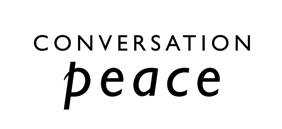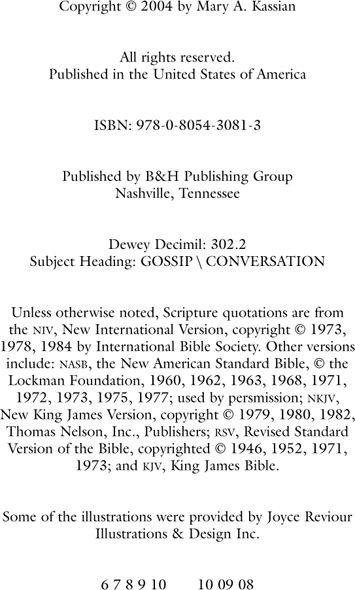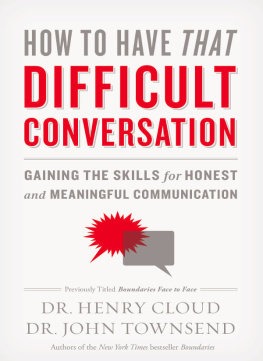


An Offer You Can't Refuse
There it was, emblazoned in big, bold letters:
Never again find yourself at a loss in any verbal encounter!
Learn the magic words and phrases to control any situation!
Hmmm. Magic words and phrases? I turned the glossy brochure over. Amazing! With their cassettes, I'd learn the exact words and phrases to use! I'd be able to say the right thing almost automatically! I'd talk my way to extraordinary success be popular build friendships that last through thick and thin get along better with my spouse and children turn adversaries into allieswith just a few deft phrases! All thisand morefor only $59.95!
Wow! What a deal! If only it were true. Sixty dollars would be a small price to pay to transform my speech and improve my relationships! I sighed and let the slippery paper glide across the kitchen table.
Conversation peace. We all want it. The promise attracts us. But I suspect that learning a few magic words and phrases won't bring about the changes we desire. Even if the techniques are good, chances are that in the heat of conflict we won't have the power to curtail our anger and use them properly. No, deft phrases won't do it. Slick techniques won't do it. Money won't do it. If we are honest, we must admit that the only effective way to change our words is to undergo a powerful change of heart. And that's what Conversation Peace is all about: a change of heart. Being transformed from the inside out.
I believe that our communication problems are, at their deepest root, spiritual problems. As such, they require spiritual solutions. And for that, we must turn to God. Conversation Peace presents seven powerful speech-transforming elements that are based on the Bible. For the final word on how to transform our words, the Bible is our book! It sets a high standard for speech and also for thoughts and attitudes. But even more importantly, it reveals the secret for how to reach that standardpower. God's power. Not some magical formula or phrase. Not the right technique or combination of words.
That's not to say that practical techniques are of no use. They can be very helpful. And we'll be learning lots of them: listening skills, body language, resolving conflict, how to express yourself clearly, how to say you're sorry, how to resist manipulation, how to set a positive communication climate this book is chock-full of practical advice. But at heart, this book is about God changing our hearts. He has given us his Word to transform and revolutionize our words and lead us into conversation peace.
Wow! What a deal! Come join me as we take him up on this exciting offer!
Mary

Our tongues determine the direction of our lives.

The Bible compares the tongue to a rudder of a ship and to a bit in the mouth of a horse. Though relatively small, all three of thesethe rudder, the bit, and the tonguehave tremendous power. A rudder turns a ship, a bit turns a horse, and our tongue turn our lives in the direction we will go. Your tongue can take you into calm or troubled waters. It can make or break your relationships. Harness the power of navigation to turn your tongue in the right direction.
BREATH FRESHENER
For, whoever would love life and see good days must keep his tongue from evil and his lips from deceitful speech. He must turn from evil and do good; he must seek peace and pursue it.' 1 Peter 3:1011
CHAPTER 1
Put Your Hand to the Wheel
The tongue is our principle steering mechanism.
Where do you want to go today? God wants to take you to all sorts of fascinating places. But in order to reach these destinations, you will need to put your hand to the wheel to take control of your principal steering mechanismyour tongue. Have you discovered that whether you sail into calm or troubled waters depends a great deal on the words that come out of your mouth? Your tongue is the rudder that determines the direction of your ship.
The Rudder of a Ship
This summer my youngest son will make his maiden voyage as captain of the family fishing boat. It's a rite of passage that happens at about the twelfth year of every Kassian's life. The ceremony goes something like this: Grandpa Kassian will outfit his newest protg in a captain's hat and puffy orange vest and seat him on the painted blue bench at the helm of the vesselhandon the tiller. After a few pulls, the three-and-one-half horsepower outboard will sputter to life, and with a push of his foot, Grandpa will launch the shiny silver craft out into the quiet waters of the lake.
Or take ships as an example. Although they are so large and are driven by strong winds, they are steered by a very small rudder wherever the pilot wants to go.
JAMES 3:4
As instructed, the new captain will display his skill by taking five or six passes close to the shoreline bordering the cabin. Dad and Mom (that's me!), Grandma and Grandpa, aunts, uncles, siblings, and any other spectators in the vicinity will shout and cheer. Camcorders will whir and shutters will snap (more lake pictures for the album!).
Before making the solo flight, the young captain will have been tutored in how to steer the boat. Pushing the tiller starboard (right) turns the vessel port (left). Pushing the tiller port turns it starboard. Grandpa will have instructed him well.
The highlight of the demonstration occurs when the captain navigates the boat around in a broad circle and pulls back in along the pier. Victoriously, he'll turn off the motor, dock the boat, and run ashore to receive his accolades. Passing this test earns him the right to take the small boat out to go fishing in front of the cabin.
Steering a boat is based on a relatively simple concept. It operates on the principle of unequal water pressures. When a rudder is turned so that one side is more exposed to the force of the water, the stern (back) of the boat will rotate toward the side of the rudder where the water pressure is less. In small craft, the rudder is connected to a handle called a tiller and turned manually. In larger vessels, it is turned by hydraulic, steam, or electrical machinery connected to a wheel. In all cases, the rudder is relatively small but is responsible for setting the direction of the entire vessel.
In the Bible, the apostle James compares our tongues to the rudder of a ship. Our tongues navigate our ships. The word navigate comes from the Latin words navis, meaning ship, and agereto drive. To navigate is to plan, steer, and manage one's movement and course.
Though ships are driven by strong winds, they are steered by a very small rudder wherever the pilot wants to go. If a ship is not directed, it will be at the mercy of the wind and currents and will be lost or shattered on the rocks. By steering correctly, the pilot is able to move even a large ship in the right direction. In his book, James wants us to realize that what we talk is where we'll walk. If we use our tongues for good, we will head in the right direction; if we use our tongues for evil, we will steer our ship toward destruction.
Next page












